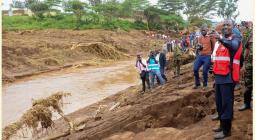Threatened by floods, N’Djamena obtains $20 million for community resilience

Chad's Integrated Management Project for Flood Control and Urban Resilience in N'Djamena (Pilier) recently entered its second phase. It has received $20 million in funding from the World Bank.
Chad’s Integrated Management Project for Flood Control and Urban Resilience in N’Djamena (Pilier) continues while the damage caused by floods in the central African country, particularly those of 2022, is still visible. On May 13, 2024, the Chadian Ministry of Land Management, Housing and Urban Planning signed a financing agreement with the World Bank for the implementation of component 2.2 of the “Pilier”, which concerns community interventions.
The $20 million envelope will be managed by the United Nations Development Program (UNDP), which is acting as implementing agent for this climate change resilience project. “This component will actively involve local communities in the planning and execution of actions to mitigate the effects of flooding”, says the Chadian Ministry of Land Management, Housing and Urban Development. In this way, local flood victims will be able to contribute their knowledge and expertise to solving the problems encountered on the ground by the “Pilier” implementation team.
Part of this additional funding from the World Bank will enable the establishment of local committees made up of representatives from flood-affected neighborhoods, so that they can play an active role in the management and implementation of preventive measures. An effective early warning system will also be put in place to rapidly inform residents of the potential risks associated with imminent flooding. This will enable the populations concerned to quickly take the necessary measures to protect their property and ensure their safety.
Making the city of N’Djamena more resilient
More than 340,000 people from over 55,000 families have been affected by unprecedented flooding caused by torrential rains across Chad, according to a recent report by the United Nations Office for the Coordination of Humanitarian Affairs (OCHA). This phenomenon has also caused significant material damage.
Through the “Pilier”, the aim is to make the Chadian capital N’Djamena more resilient and sustainable. In all, the project comprises four components that will improve the city’s resilience to the challenges of climate change by 2026.
In addition to community interventions, “Pilier” will also enable the rehabilitation and construction of new infrastructure in N’Djamena, the provision of technical assistance and investment, solid waste management along drainage systems, capacity building and technical assistance to improve operations and maintenance planning and budgeting, household awareness-raising and supply of relevant equipment, upgrading the pre-collection system in selected areas by providing pre-collectors with the necessary equipment, upgrading the city’s waste volume monitoring system and setting up a recycling demonstrator.
In addition, pre-identified temporary waste disposal sites will be set up to handle the waste collected. Conditional Emergency Response (CERC) will also be implemented in N’Djamena, to help the Government of Chad improve response times to crises, either by financing the implementation of emergency response, early recovery and/or urgent reconstruction measures. For the record, the World Bank granted the Chadian government initial financing of $150 million in 2023, for the implementation of the “Pilier”.





